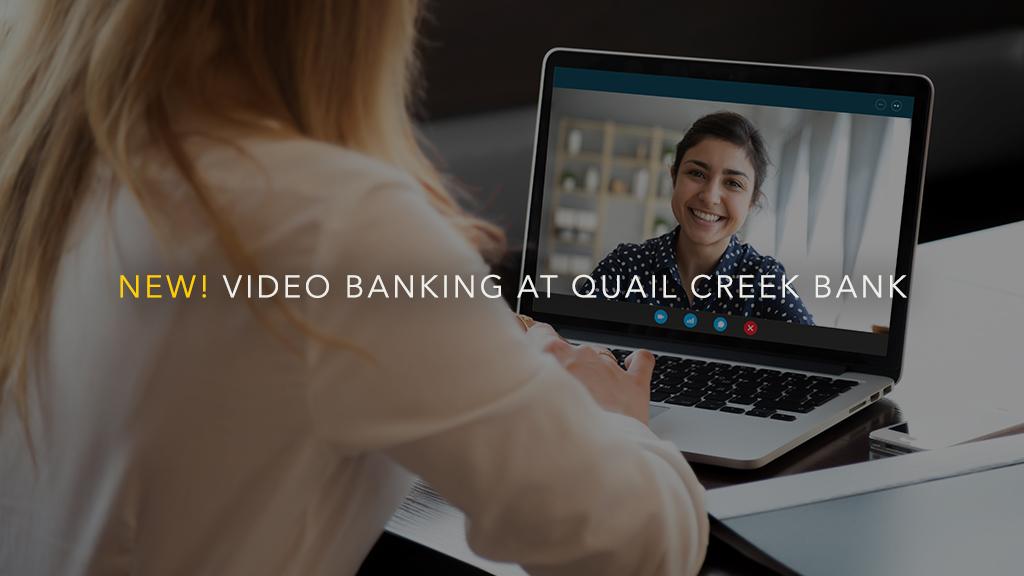Online Security
Secure Log-in
It is important to Quail Creek Bank to ensure the security of your personal information. Your login information is SSL protected when you log in to online banking, or any Quail Creek Bank online services. SSL technology encodes information secretly, or encrypts data that is being sent over the Internet between your computer and Quail Creek Bank, helping to ensure that the information always remains confidential.
Username and Password
By the mandatory use of a username and password to access your account information, Quail Creek Bank provides additional security for your financial information . However, It is important that your username and password are kept confidential.
Secured Socket Layer technology (SSL)
If you are going to enter confidential information on a website, such as a password, check the status bar at the bottom of your Web browser window for a lock symbol. If you see the lock symbol, the site you have entered is secure and using SSL.
Security Tips
Memorize your username and password. Your online username and password authenticate an online banking session. You should never write them down anywhere, save them to your computer, or reveal them to anyone.
Create a password that:
- Is not obvious or easily obtainable information.
- Is 8 – 12 characters in length. The longer the password, the better.
- Includes upper and lower case letters
- Includes numbers.
- Has at least one special character.
Change your password regularly.
Remember to always log off of online banking, and close all browsing sessions immediately for security. You may not always be at your own computer when you bank online, therefore, it is important to log off when you are finished with your online banking session and close all open browsers.
Always use the built-in security features for your browser.
Make sure the computer you use has current anti-virus software. Anti-virus software guards against new viruses by requiring frequent updates.
To help prevent unauthorized access to your home computer install a personal firewall.
If you are using wireless access, it should always be secured with strong password encryption.
Be suspicious of unsolicited email from anyone or any entity that asks for your password, Social Security number, or any other highly sensitive information. Legitimate businesses typically do not ask for this type of information over the Internet. Contact the business directly to verify the authenticity of the e-mail. Do not reply to or click on any links or pictures in unsolicited e-mails, especially those asking for personal information.
Promptly and carefully review your account statements such as bank statements, credit card statements, as well as mobile phone and home telephone bills for unauthorized charges or activity. Regularly check your statements and account activity online to spot questionable transactions.
Do not give out personal or financial information online, via text message or on the phone unless you initiated the contact and know the party you are dealing with is legitimate.
Notify Quail Creek Bank immediately by phone if you notice any unusual account activity.
Safe Mobile Banking
With the recent release of the iPhone 5, the Oklahoma Bankers Association, on behalf of Oklahoma community banks, took the opportunity to inform Oklahomans about safe mobile banking.
The news release, sent to all Oklahoma media, stated:
Mobile banking is safe, convenient with precautions
OKLAHOMA CITY - Convenience is the driving factor in the rise of mobile banking. It opens the door to consumer choice and access to banking options. With the recent release of Apple's iPhone 5 and the rise in use of smartphones, consumers are urged to be cautious when using mobile devices to do their banking.
"Smartphones and mobile banking can be a great tool in deterring fraud in that it allows you to check your bank account frequently and partner with the bank to stop any fraudulent activity before it becomes a problem," said Elaine Dodd, vice president/fraud at the Oklahoma Bankers Association. "At the same time, everyone needs to be educated that your smartphone should be treated just like a checkbook or wallet and not be left accessible to potential fraudsters because of the information it does hold."
Following a few simple steps can prevent a big headache later. Oklahoma community banks in partnership with the OBA offers the following tips for consumers to protect their information:
-- Avoid storing sensitive information like passwords and social security numbers on your mobile device;
-- Password protect your mobile device and lock it when you're not using it;
-- Avoid using WiFi and instead opt to stay on a broadband connection or secured WiFi at home;
-- Be aware of your surroundings. Don't type any sensitive information if others around you can see;
-- Log out completely when you complete a mobile banking session;
-- Protect your phone from viruses and malware just like you do for your computer by installing mobile security software, if available for your device;
-- Download the updates for your phone and mobile apps;
-- Use discretion when downloading apps;
-- Let your financial institution know right away if you change your phone number or lose your mobile device;
-- Monitor your accounts regularly and report suspicious activity to your financial institution immediately.



